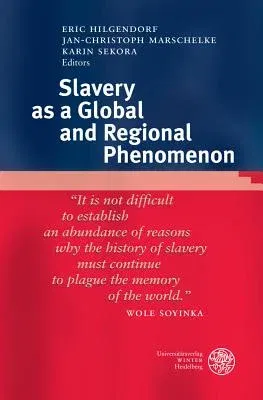Slavery as a Global and Regional PhenomenonHardcover, 1 June 2015

Qty
1
Turbo
Ships in 2 - 3 days
Only 4 left
Free Delivery
Cash on Delivery
15 Days
Free Returns
Secure Checkout

Part of Series
Anglistische Forschungen
Print Length
224 pages
Language
English
Publisher
Universitatsverlag Winter
Date Published
1 Jun 2015
ISBN-10
3825363937
ISBN-13
9783825363932
Description
Product Details
Book Format:
Hardcover
Country of Origin:
US
Date Published:
1 June 2015
Dimensions:
25.15 x
17.53 x
1.52 cm
ISBN-10:
3825363937
ISBN-13:
9783825363932
Language:
English
Location:
Heidelberg
Pages:
224
Publisher:
Series:
Weight:
430.91 gm